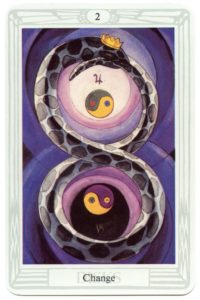 Hadit’s raison d’être is to explore itself through the artifice of duality. According to the commentaries, this is why the nature of existence is pure joy, and why the character of all change is love. The cardinal sin is to take the presentation of duality as a restriction of my will rather than a vehicle for the exploration of it. For example, we prefer this change and call it good, we dislike that change and call it bad, or we find that change too slow so we call it boring. Yet to understand the universe perfectly and to resist its pressures constitute the virtues of a Master of the Temple. This is analogous to the arahant overcoming greed, hatred, and delusion. But the motivation here is not the cessation of all change (as of parinibbāna) but rather the enjoyment of all change for its own sake, action directed solely unto Nuit, each moment without lust of result. One might think of it on analogy with inertial change of position—which is experimentally indistinguishable from rest.
Hadit’s raison d’être is to explore itself through the artifice of duality. According to the commentaries, this is why the nature of existence is pure joy, and why the character of all change is love. The cardinal sin is to take the presentation of duality as a restriction of my will rather than a vehicle for the exploration of it. For example, we prefer this change and call it good, we dislike that change and call it bad, or we find that change too slow so we call it boring. Yet to understand the universe perfectly and to resist its pressures constitute the virtues of a Master of the Temple. This is analogous to the arahant overcoming greed, hatred, and delusion. But the motivation here is not the cessation of all change (as of parinibbāna) but rather the enjoyment of all change for its own sake, action directed solely unto Nuit, each moment without lust of result. One might think of it on analogy with inertial change of position—which is experimentally indistinguishable from rest.
